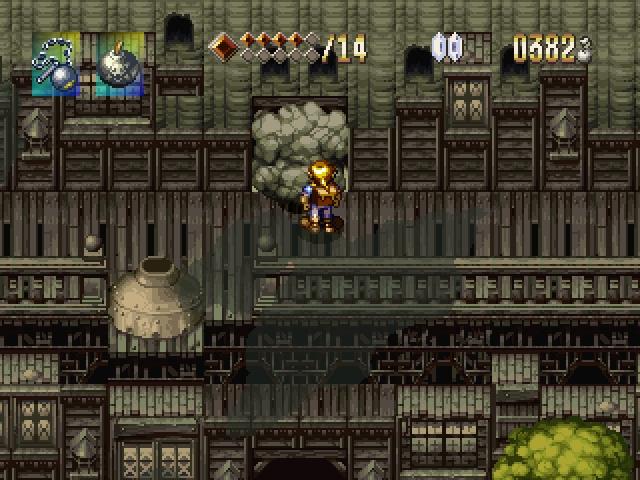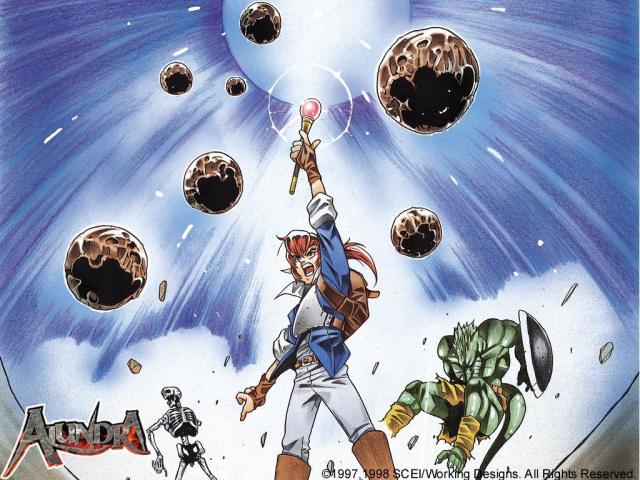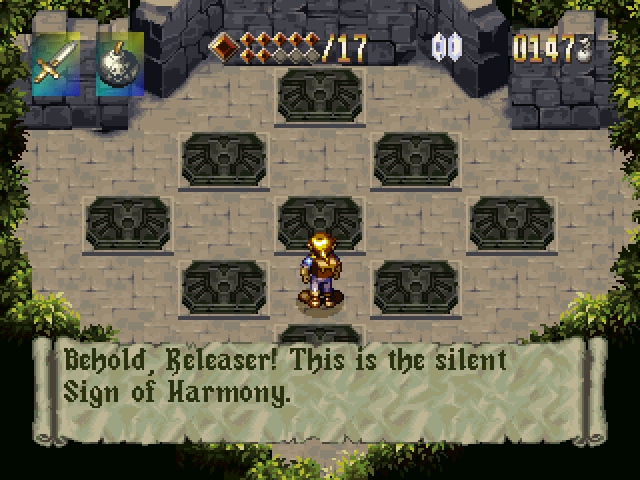Keeping up with our RPG themes this week, we pay our respects to a more traditional action RPG that hit the ground running, only to hit a brick wall soon after
Alundra was always one of those games that wore its influences firmly on its sleeve. Despite probably looking more like Zelda than a lot of the games in the Zelda franchise, Alundra took on a more adult tone than its competition, with a darker story and some fiendish puzzles to boot. Released in 1997 for the PS1 Alundra saw a pretty impressive first run with over 100K copies sold in a single month in early 1998. After this initial pressing Alundra has all but vanished, and despite a very loyal and vocal cult fan base, the game has unfairly receded into obscurity as time has gone by.
Why it was awesome
Alundra was able to cut a very fine line between a cartoony and bright visual aesthetic with an intriguing plot filled with morbid themes. Imagine Zelda: a link to the past but dealing with clinical depression and you’re about there. The story featured our hero, a silent protagonist unsurprisingly called Alundra, being shipwrecked on the tiny island of Inoa and attempting to find out his origins. He soon becomes aware that he is a part of an ancient clan of Dream walkers, who possess the power to enter peoples dreams and alter them. Soon Alundra finds that the mysterious comas the villagers are falling into are caused by an ancient demon named Melzas, who Alundra must prevent from being resurrected at all costs.
Whilst the bit about ancient demons being revived isn’t exactly a fresh plot mechanic, Alundra’s dream walking abilities gave each of the game’s levels a unique twist. All the dream levels are based upon the dreamer’s personality and traits, giving a needed variety to the game’s locales as well as granting further insights into the characters. It was also nice to see that this mechanic wasn’t wrung for all it was worth. When I first read the blurb for Alundra I was concerned you’d just hop from one dream to the next in a linear fashion, but I couldn’t have been more wrong. The over-world of Inoa was expansive and full of secrets and side-quests, and there was an equal amount of dungeons both inside and outside of the villagers minds to keep things fresh.

Even though they weren't very impressive at the time, Alundra's graphics have aged surprisingly well
The results of your forays into the surrounding area and the minds of the villagers were also a mixed affair. Remember those dark themes I was discussing earlier? I wasn’t just saying that lightly. Alundra was a game that was not afraid to kill off the odd character hear and there, and it was anyone’s guess who would be next to go. It gave the game a certain tension that other RPGs of the time were lacking, and every time I came out of a person’s dream I’d be biting my nails waiting to see if they had survived or not… The guilt you felt when that foreboding acoustic guitar melody kicked in is something that has stayed with me till this day. It certainly kicked the more predictable “well done, you got the medallion of the forest” scenarios seen in other RPGs in the teeth.
One of the other aspects that always seemed woefully under-appreciated in Alundra was the level design itself. All the layouts of the levels just made sense and the game had a very natural progression as a result. The dungeons themselves were also well made, and had what I would describe as an organic type of design. I know that sounds like an odd way of describing it, but bare with me here. In a lot of other action adventure titles you never feel like you’re exploring the mines of Trarg (or wherever it is). You feel it’s a dungeon in a game that has a tile set resembling said mine. This wasn’t the case in Alundra. Obviously discounting the abstract dream levels, the dungeons in the game all felt like they were a real mansion or mine or lumber mill etc. that you had to navigate your way through. There were no convenient blocks and switches to use. If you wanted to progress you had to work for it and think a little bit outside of the box. There was no hand-holding going on here that’s for sure.
That leads us on to one of the more jarring aspects of the game: The difficulty. A lot of the puzzles inhabited the familiar “you need particular weapon X to access this area” paradigm, but others were just plain nasty. One forum member described some of the puzzles in Alundra as “the work of the devil,” and it was regularly stated that the game is in-completable without a guide or FAQ to hand. I look back on this with a certain fondness going for the whole “games were harder back in my day” sort of quip, but actually at the time I was just plain annoyed by the challenge. I had no internet and no paper guide to hand, making Alundra a constant uphill battle. The game was still fun as hell, but there is no denying that Alundra was never designed for the faint of heart.
The best thing was that Alundra was a title that kept on giving. Provided you could climb each of the exceptionally high hurdles it threw your way, Alundra was long. Like really super mega large. That’s just to clear the main story, if you wanted to dabble in some of the side-quests, take in the sights and go for the elusive maxed out health and magic bars, then you would have many happy hours of gaming ahead of you.
Why it was forgotten
Alundra was an odd title to be forgotten as it had, not only a very commercially successful first few months, but also received a unanimous critical applause. So why is it seldom discussed today? Well partial blame must be levelled at its publisher Working Designs. Working Designs were famed for translating a lot of eastern RPGs and publishing them for the western audience. They had an odd habit of going overboard with the packaging though, often printing games with full colour manuals, full spread maps and in the case of Lunar: Silver Star Collection, a leather bound manual well over a hundred pages in length! As cool as this was, it did mean that ordering their titles was an often expensive endeavour leading to fewer establishments stocking their games. Combine that with a frustratingly low production rate and we can see how Alundra’s commercial reception was able to run out of steam quite quickly. The irony is, despite their reputation for premium packaging, Working Designs packaged Alundra as a standard edition only with no whistles or bells whatsoever.
When discerning the legacy (or lack of) surrounding Alundra we must also consider industry trends at the time. Alundra was an early exclusive for the original Playstation, but arguably it didn’t fit in particularly well with its usual repertoire of games. Being not only the newcomer, but also the least technically impressive of that console generation, the PS1 games that are remembered are the ones that pushed gaming to its limits and gave the system a unique identity. Titles such as Final Fantasy 7 and Metal Gear Solid immediately spring to mind. Unfortunately Alundra, whilst oozing quality, is clearly derivative of the Zelda franchise. This pinpoints exactly why Alundra was never going to make a lasting mark on the industry as we know it.
It certainly doesn’t help its perception among more modern gamers, that the quality and exposure of the Alundra franchise has been going downhill since early 1998. Fast forward to the start of the new millennium and we see the release of Alundra 2, a game that taught us just how far an apple can fall from the tree. The original game, whilst not inventing in any way, was able to compete with the gameplay of other titles in the genre while having its own unique identity. Alundra 2 however was just really bland. It lost the tight level design and gameplay mechanics, along with the dark overtones of the original, causing it to be a game that was mediocre at best. It’s not its fault in truth, as it was originally designed as an entirely different IP, entirely unrelated to the Alundra franchise. However, some retarded suit, most likely suffering from every mental disability known to man, had the fantastic idea of calling it an Alundra sequel in order to perpetuate more sales. Guess what genius, it didn’t work. All it has done is poison the name of a once great franchise that had barely got off the ground. You can ignore and deny its existence, but Alundra 2 is a parasite that never goes away.
Possibly the biggest crime against Alundra, and one that is inflicted upon most forgotten classics, is the untapped potential to turn it into DLC. Alundra would be the most insane download on the Playstation network by a long shot. But it’s probably too much to ask. Don’t get me wrong, it deserves a re-release, but I’m a reasonable man and I can understand that publishing rights can get in the way. The true crime against Alundra is the fact that it is actually available on the PSN, but in Japan only. It really is a situation of holding the midget (that’s us Alundra fans) at arms length. There is already an English translation, and considering that the western publishers closed down five years ago, I can’t fathom why on earth this fantastic title hasn’t seen a western release on the PSN.

Anime style visuals always hit me in the soft spot, but they arguably attracted the wrong audience for Alundra
The fatal flaw that all hero’s possess in a good tragedy isn’t lost on Alundra, and is possibly one of the key reasons for its modern obscurity. The game’s visual direction is an anime style and, even though it has aged quite well, it was always at odds with the dark sensibilities the game otherwise possesed. I’m not saying the visuals detracted from the experience, but it wouldn’t be a wild assumption to say that a darker, more realistic graphical style may have attracted the hardcore audience that Alundra’s gameplay is so clearly aimed at.
Without a downloadable alternative, (yes I’m still grumbling about it) gamers interested in taking on the Alundra challenge must track down an old physical copy and hope that it’s still in working order. Considering the limited print run, this is actually easier (and certainly cheaper) than you might expect. UK residents will be best served by amazon.co.uk where a used copy is currently going for a fantastically low price of under £10. Best snap this bargain up while the going’s good. US residents get it even easier with copies on ebay going for around the ten dollar mark. Time may have forgotten it, but if you play it, I can guarantee that you will not.















